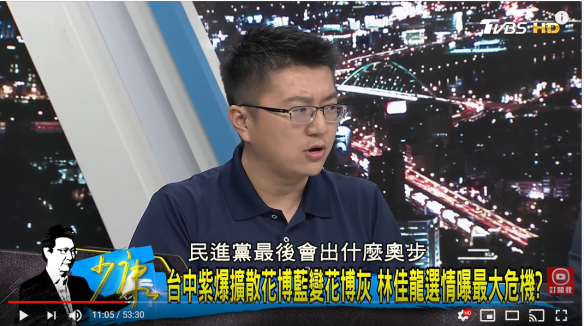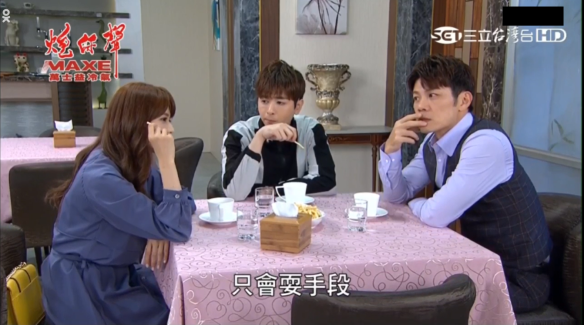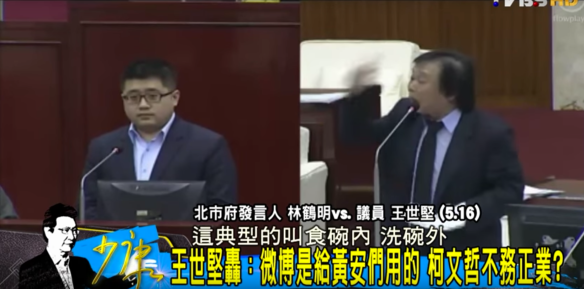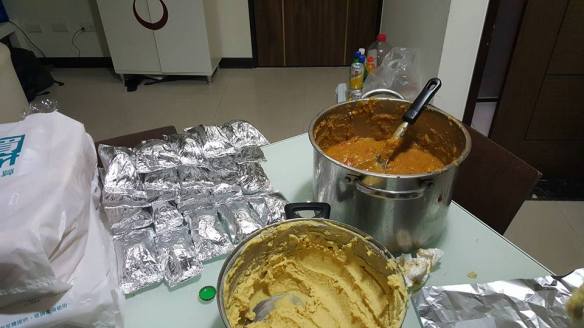「奧步」 is the common written form for the Taiwanese expression 「漚步」 àupō͘ meaning a sly or crafty move. This is just one of those phrases you’ll hear again and again. I heard it a while ago in the run-up to the election:
「尤其是大家其實現在都在期待就是民進黨最後會出什麼奧步。」
“Especially when at the minute everyone is actually waiting to see what crafty maneuver the DPP will end up pulling at the last minute.”

You can hear it around the 11:04 point in the video below:
I heard it again just now while getting my hair cut (shorn off), in the Taiwanese soap opera 《炮仔聲》 (Ep 327) playing in the background. It was translated into Mandarin in the subtitles as 「耍手段」:
「這個江宏傑真的有夠可惡,只會耍手段,不是用錢收買人,就是抓人的親人來威脅。」
“That Kang Hong-kiat is a real piece of work, he’s always got some sly trick up his sleeve. If he isn’t buying people off, he’s using people’s families to threaten them.”

You can hear her say it here (1:46;47).
Earlier in the episode, one character describes getting a woman drunk in order to get her into bed (quite rightly) as an 「奧步」, although this time it’s translated into Mandarin as 「卑鄙手段」 “how could I use that kind of dirty tactic?”

You can hear him say it here (0:40:56).
It’s one of those really useful phrases that’s really hard to find the right situation to use. In the first example I used, it’s used in a Mandarin sentence, so you can use it that way too, but make sure your tones are on point if you’re going to, or you’ll stand there shamefacedly repeating yourself until you have to spell it out like I did in the kitchenette at work when I called my colleague a 抓耙仔 jiàu-pê-á/liàu-pê-á (a snitch). I said bei instead of pei or something *shrugs*.

 TVBS’s ‘The Situation Room’ has returned to talking about the
TVBS’s ‘The Situation Room’ has returned to talking about the  Ko Chih-en (柯志恩), a KMT legislator-at-large, is another regular on TVBS’s political panel show ‘The Situation Room’.
Ko Chih-en (柯志恩), a KMT legislator-at-large, is another regular on TVBS’s political panel show ‘The Situation Room’. One of the great things about living in Taiwan is that when political leaders make speeches, like the speech made by Xi Jinping on Jan. 2, there is a flurry of discussions and critique on political panel shows and on social media, and people aren’t scared to express their own opinions on them. This is also a great learning opportunity, as people are more likely to come out with an interesting turn of phrase when they’re not being overly careful about what they’re saying.
One of the great things about living in Taiwan is that when political leaders make speeches, like the speech made by Xi Jinping on Jan. 2, there is a flurry of discussions and critique on political panel shows and on social media, and people aren’t scared to express their own opinions on them. This is also a great learning opportunity, as people are more likely to come out with an interesting turn of phrase when they’re not being overly careful about what they’re saying.
 I don’t have a TV at home, so when I was recruited by a friend to wrap tamales at his house, I got a rare opportunity to watch some political talk shows, which are usually amusingly varied according to the political affiliation of the channel they’re broadcast on. This one from TVBS (relatively Kuomintang-leaning/blue), is called ‘The Situation Room’ in English and 「少康戰情室」 in Chinese. Footage from the Legislative Yuan is always a great opportunity to learn some Taiwanese of the shouty aggressive variety:
I don’t have a TV at home, so when I was recruited by a friend to wrap tamales at his house, I got a rare opportunity to watch some political talk shows, which are usually amusingly varied according to the political affiliation of the channel they’re broadcast on. This one from TVBS (relatively Kuomintang-leaning/blue), is called ‘The Situation Room’ in English and 「少康戰情室」 in Chinese. Footage from the Legislative Yuan is always a great opportunity to learn some Taiwanese of the shouty aggressive variety: